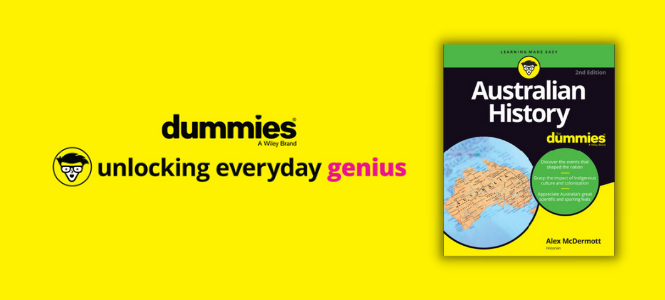
March is Dummies month here at Booktopia, where you can unlock your everyday genius with up to 30% off RRP on selected Dummies guides, for a limited time — including Australian History For Dummies (2nd Ed) by Alex McDermott! With this book, you can discover the fascinating details that made Australia the country it is today.
Read a guest blog from Alex McDermott on how Australian elections work below!
An Australian Elections Explainer
What’s the point of an election? We’ve got one coming up in Australia in the next couple of months. But what are they actually for?
In a modern democracy the basic purpose is to hire or fire a government.
Democracy is generally taken to mean ‘the people are sovereign’. That is, they get to be the deciders about what happens, and what steps their government should take. Historically, in a smaller scale and more direct democracy, ordinary citizens had more input into the different decisions a government makes.
In the town square, on the local meeting ground, or at the assembly hall the pros and cons of a decision could be properly debated and deliberated over before action was taken. The assembled citizens could discuss and resolve how much taxes should be paid, whether to invade the neighbouring suburb say, when to lay crops, whether to have a big parade and so forth.
This approach is great – it’s the heart of what democracy is meant to be out. Ordinary members of a community deciding for themselves what to do, and not being ruled by overlords or dictators. But it doesn’t really work when your national community is a territorial state the size of a continent and containing millions of citizens though does it?
And this is where elections come in.
We vote at elections. Through voting we are choosing the person or political side we think will do the best job of representing our ideas, needs and interests. Whoever gets the most votes and preferences in each different electorate is the winner. The winner gets to go to the big house on the big hill in Canberra – Parliament. Whichever political side (generally one or two political parties working together) has enough of its own members voted to parliament to win the votes for the important debates and big decisions gets to form a government.
Every three years or thereabouts another election is held. This is the one big moment for ordinary voters in a modern democracy. This is where we get to effectively rehire or fire the government, depending on how good a job we think they’ve been doing.
This system is obviously not without its problems and imperfections of course. Three years is a long time. Our representatives might start with the best of intentions to represent our interests and the common good, but then get distracted by special interests and smaller, more elite groups who happen to have a close proximity to the seat of power. Questions of accountability arise.
It does have one huge advantage though. It keeps our evenings and weekends free. All that discussing and debating and deciding, if you’re going to do it properly, that takes up a lot of time and energy. And we have our lives to live. Australia didn’t gain the moniker ‘Land of the Long Weekend’ for no reason after all. The system can work, and work pretty well – but without elections, the whole thing collapses. So let’s file them under ‘Important: Don’t Throw Out!’ for now.
Australia happens to have almost the longest system of representative democracy in the world. It began with mass suffrage, or votes for ordinary citizens in the 1850s when the colonies gained self-government from Britain. This was an enormous achievement, decades before other countries tried the experiment, but by ‘ordinary citizens’ they meant ‘pretty much white men only thanks…’
Then in the 1902 Australia became the first country in the whole world where women could both vote and stand for election themselves. Another huge achievement. On the not-so-great side though, at the same time Indigenous and non-whites were systematically excluded from voting. This took until the 1950s and 1960s to sort out, but we got there in the end. It just took us a darn while is all.
—Australian History For Dummies (2nd Ed) by Alex McDermott (Wiley) is out now.

Australian History for Dummies
2nd Edition
Australian History For Dummies is your tour guide through the important events of Australia's past, introducing you to the people and events that have shaped modern Australia.
Be there as British colonists explore Australia's harsh terrain with varying degrees of success. In this informative guide you'll: Find out about Australia's infamous bushrangers - Learn how the discovery of gold caused a...






Comments
No comments